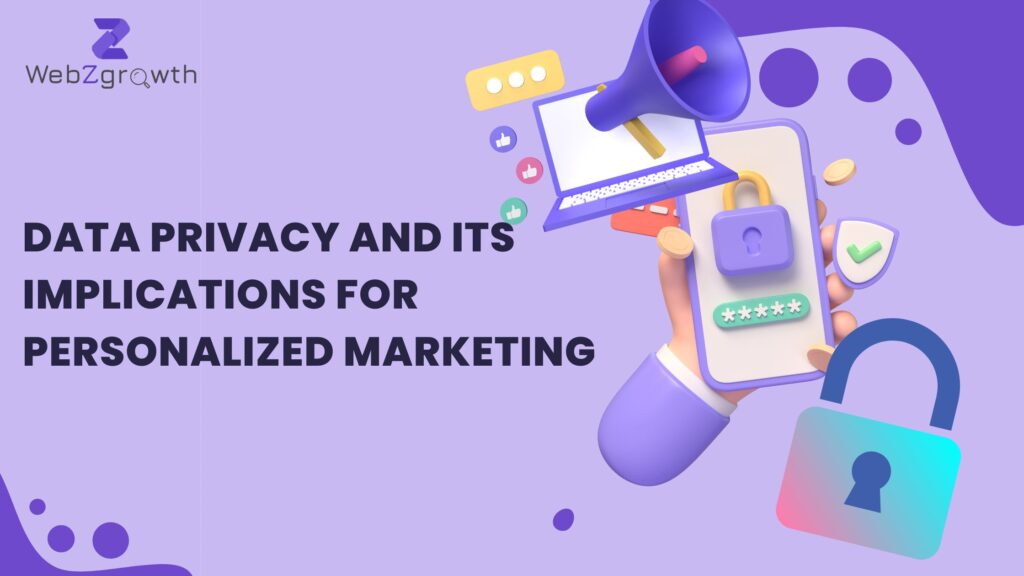Introduction: The Balancing Act Between Privacy and Personalization
Imagine visiting a website, and the ads feel like they are reading your mind. You see products you were just thinking about. Convenient, right? But what if this data was used without your knowledge? That’s where
data privacy steps in.
Today, businesses thrive on
personalized marketing. However, increasing concerns about
user data protection have changed the game. Let’s explore how data privacy laws affect marketing strategies and what businesses can do to stay compliant while delivering a tailored customer experience.
Why Data Privacy Matters More Than Ever
With the rise of
GDPR (General Data Protection Regulation) and
CCPA (California Consumer Privacy Act), businesses must be transparent about
how they collect, store, and use customer data. Consumers are becoming aware of their digital footprints and demanding more control over their information.
A recent survey found that
80% of consumers are more likely to do business with companies they trust with their data. On the other hand, data breaches and privacy scandals have cost brands billions in lost revenue and customer trust.
Key Concerns Around Data Privacy:
- User Consent: Customers must agree to share their information.
- Data Security: Protection from breaches and unauthorized access.
- Transparency: Clearly explain how data is collected and used.
- Right to Opt-Out: Users should have control over their data.
Ignoring these concerns can result in penalties and loss of consumer trust.
The Impact of Data Privacy on Personalized Marketing
1. Limited Third-Party Data Access
For years, marketers relied on
third-party cookies to track user behavior. But with browsers like
Google Chrome phasing out third-party cookies, brands need to rethink their strategies.
Solution: Invest in
first-party data collection. Encourage users to sign up for newsletters, loyalty programs, or free resources in exchange for their information.
2. Stricter Customer Data Collection Policies
Companies can no longer collect data without permission.
Regulations require explicit consent before storing any user information.
Solution: Use
opt-in forms with clear descriptions of data usage. Add
privacy policies on your website to build trust and transparency.
3. Email Marketing Adjustments
With stricter privacy laws, brands must
rethink email marketing strategies. Purchasing email lists or sending mass emails without consent can result in fines.
Solution: Implement
permission-based marketing by allowing users to subscribe to content they want. Use personalization tactics like
behavioral segmentation to send relevant emails.
4. AI-Powered Predictive Analytics
Instead of relying on personal data, brands are shifting to
AI-driven insights based on user behavior trends.
Solution: Use
machine learning to analyze
customer interactions without breaching privacy laws. Tools like Google Analytics 4 help understand user intent without violating data privacy norms.
How Businesses Can Stay Ahead
1. Invest in Secure Data Handling
Consumers want assurance that their data is safe. Businesses must use
encrypted storage,
secure payment gateways, and
firewall protection to prevent breaches.
2. Educate Your Customers
Be open about how data is used. Transparency builds trust and encourages users to engage with your brand.
3. Leverage Contextual Advertising
Instead of behavioral tracking, use
contextual targeting. Ads are placed based on
content relevance rather than user history, reducing privacy concerns.
4. Use First-Party Data Effectively
Encourage users to share their data willingly through
exclusive content, discounts, and interactive tools.
5. Regularly Update Your Privacy Policies
Stay compliant with evolving laws by keeping your
privacy policy up to date. Make it accessible and easy to understand for your users.
Final Thoughts: Adapting to the New Privacy-First Era
The digital world is evolving, and
data privacy in marketing is no longer optional. Businesses must find ways to balance
personalization with privacy while maintaining trust. Adapting to these changes early will give your brand a competitive edge.
For more insights on digital marketing strategies, check out
WebZgrowth. Let’s make marketing
smarter, safer, and more customer-focused!
Visit our
website to learn more about how we can help you craft content that brings measurable results.
Fill Out the form and Our team will reach out to you Follow us on
Instagram – For tips and tricks to improve you business
Linkedin – For more information updates




